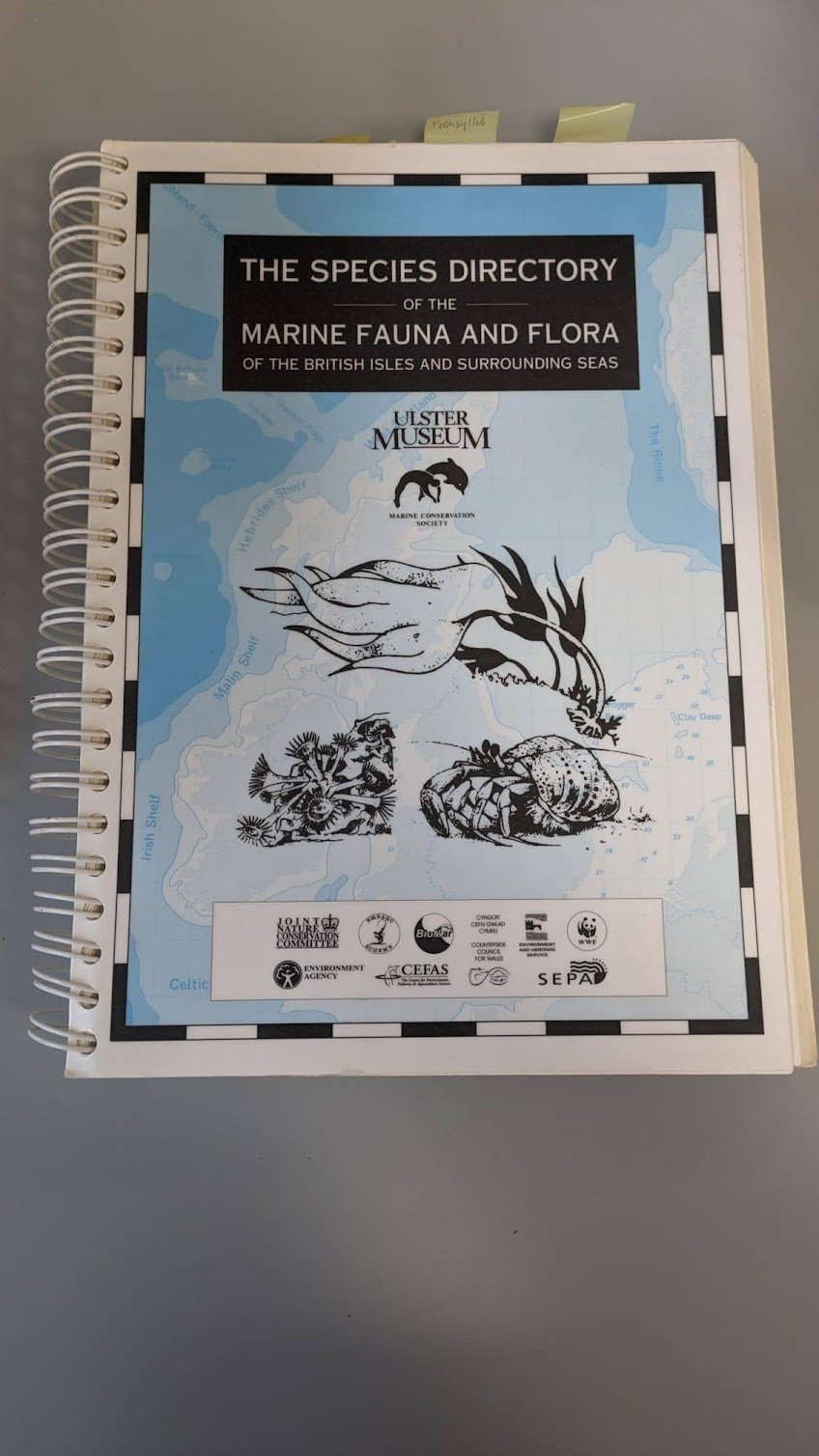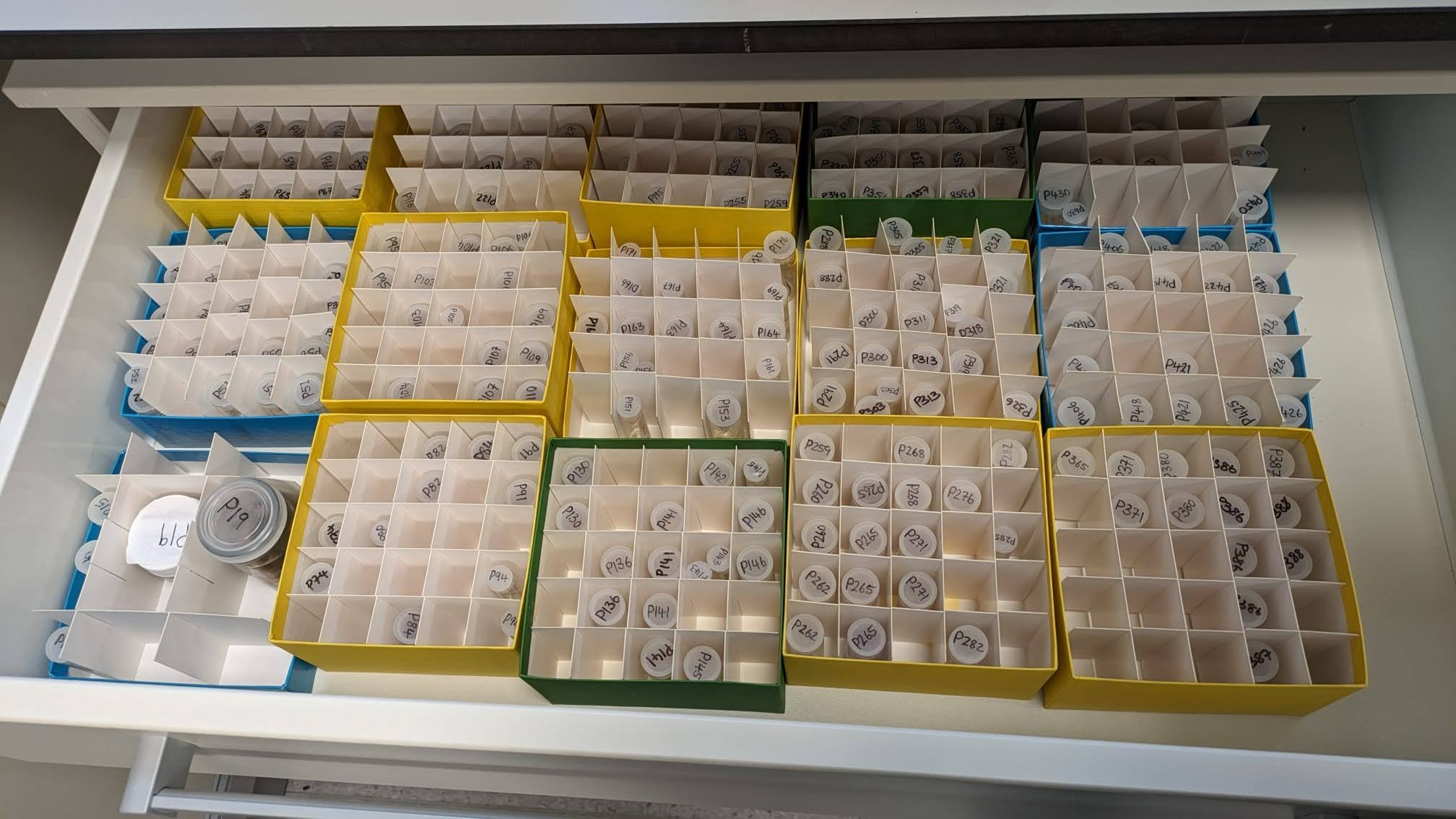Work Placement at
During my 3rd-year work placement, as part of the Applied Marine and Freshwater Biology program at ATU Galway, I had the opportunity to work with the Benthic Ecology unit under the Marine Environment & Food Safety Services (MEFSS) service area at the Marine Institute. Throughout my time there, I was fortunate enough to participate in a wide range of research activities that deepened my understanding and appreciation for marine and freshwater ecosystems. I gained hands-on fieldwork and labwork skills, and engaged with experts in multiple fields, which made the experience at the Marine Institute was truly remarkable.
To learn more about the Benthic Ecology Unit and my role on the team during my placement, keep scrolling.
And to hear more about my time at the MI, feel free to explore my blog below.
Benthic Reference Collection
The Marine Institute was created “to undertake, to coordinate, to promote and to assist in marine research and development and to provide such services related to research and development, that in the opinion of the Institute, will promote economic development and create employment and protect the marine environment.”
The Marine Institute Act 1991
Benthos Ecology Unit
-
The Benthic Ecology Unit (BEU) plays a crucial role in assessing and predicting the potential impacts of current and proposed activities, for example aquaculture, on the marine environment. The team’s work focuses on licensing activities that occur on or near the seafloor (benthic), and they work to ensure that any activities are conducted responsibly and sustainably.
The BEU closely examines the possible effects of finfish farms on the surrounding ecosystems, including sensitive habitats and species. This involves evaluating the impact of organic waste from the farms and the potential change in species composition that could disrupt local biodiversity. Through monitoring changes in benthic species composition, abundance, and distribution, the team can better understand the long-term effects of finfish farming on the surrounding environment.
The team's expertise also extends to assessing the potential impacts on protected bird species in Special Protection Areas (SPAs), under The Birds Directive (Directive 2009/147/EC on the conservation of wild birds). The BEU evaluates how activities, such as aquaculture, could affect the feeding and breeding grounds of these vulnerable species.The BEU also contributes to environmental monitoring efforts under the Water Framework Directive (WFD), which aims to maintain and improve the quality of aquatic ecosystems. This includes assessing the chemical and ecological status of transitional and coastal waterbodies and providing recommendations for achieving ‘‘Good Ecological Status’’ in accordance with the WFD objectives.
In conclusion, the Benthic Ecology Group is a critical component in safeguarding the delicate balance of marine ecosystems through rigorous assessments and monitoring efforts. Their work aims to ensure that anthropogenic disturbances, from activities like finfish aquaculture, does not negatively impact the biodiversity in the environments.
-
During my placement with the Benthic Ecology Unit at the Marine Institute, I had the opportunity to work on various tasks and projects, ranging from maintaining databases to conducting field and laboratory work. My responsibilities included updating and maintaining the Benthic faunal reference collection and performing benthic sediment and particle size laboratory analysis. Additionally, I worked on Benthic faunal data mapping, plotting, and analysis, which provided me with valuable insights into the distribution and composition of seafloor communities.
One of the significant projects I undertook involved sourcing and compiling ornithology information for Natura assessments. This task entailed researching over 70 protected bird species listed in Irish Special Protection Areas (SPAs), gathering essential data on their biology, ecology, migration patterns, breeding habits, and potential impacts from aquaculture and other disturbances. The collected data was then transformed into a screening tool that will be utilised in the aquaculture licensing process to identify potential negative effects of finfish farming on designated species within Natura2000 sites.
Another notable project I was involved in focused on developing a Benthic Monitoring Report Database for historic and current benthic monitoring reports produced by ecological consultancies for Irish finfish aquaculture sites. The project required me to digitise historic reports and create an online repository, as well as extract relevant data from web viewers and AQUAMIS, the Marine Institute's aquaculture management information system. This database will serve as a valuable resource for tracking site-specific records over time, proving beneficial for license renewals and decision-making processes. Furthermore, the collated data from this project will be integrated into PowerBI dashboards and Jupyter notebooks, providing a comprehensive and easily accessible overview of site track records to inform management decisions.
These two projects, along with my collaboration with the aquaculture and fisheries sections on surveys, fieldwork, and lab work, gave me a comprehensive understanding of the diverse aspects of benthic ecology and its role in sustainable marine resource management.
-
White-clawed crayfish (Austropotamobius pallipes) is the only crayfish species found in Ireland, where it inhabits rivers, streams, canals, and lakes, particularly over limestone areas.
-
As I look forward to beginning a career in marine biology research, the experiences from my work placement have undeniably played a crucial role in preparing me for this exciting path. The knowledge gained and skills developed during this period have not only broadened my understanding of various facets of marine biology but have also fueled my passion for conservation and innovation.
Ornithology research exposed me to the fascinating world of avian biology, behavior, and the challenges faced by these species. It reinforced my commitment to contributing towards their conservation and inspired me to explore further research opportunities in this area.
Developing a database for historic benthic monitoring reports reinforced the importance of historical data in establishing baselines and understanding changes over time. This experience emphasized the significance of efficient data management systems and inspired me to seek ways to make scientific information more accessible.
Gaining insight into the aquaculture sector, including Integrated Multi-Trophic Aquaculture (IMTA) innovations and licensing requirements, expanded my understanding of the complexities involved in sustainable marine resource utilization. This exposure kindled an interest in the dynamic interplay between economic development and environmental preservation.
Exposure to shellfish safety through phytoplankton taxonomy and biotoxin analysis using High-Performance Liquid Chromatography (HPLC) provided me with a deeper appreciation for the intricacies of seafood safety and the importance of ensuring public health.
A pivotal experience that significantly prepared me for a future in molecular ecology was my involvement in the National Crayfish Monitoring Surveillance Programme. Using cutting-edge eDNA techniques for environmental monitoring ignited a passion for non-invasive, highly effective monitoring methods. The opportunity equipped me with invaluable fieldwork skills, such as using sampler pumps, recording data, and implementing biosecurity measures. Additionally, it honed my laboratory skills in eDNA extraction, PCR techniques, and data analysis, providing me with the tools to contribute meaningfully to molecular ecology research.
As I venture forth into the world of marine biology research, these experiences and the wealth of knowledge gained will serve as my compass, guiding me towards a future dedicated to understanding, conserving, and safeguarding our invaluable marine ecosystems.










